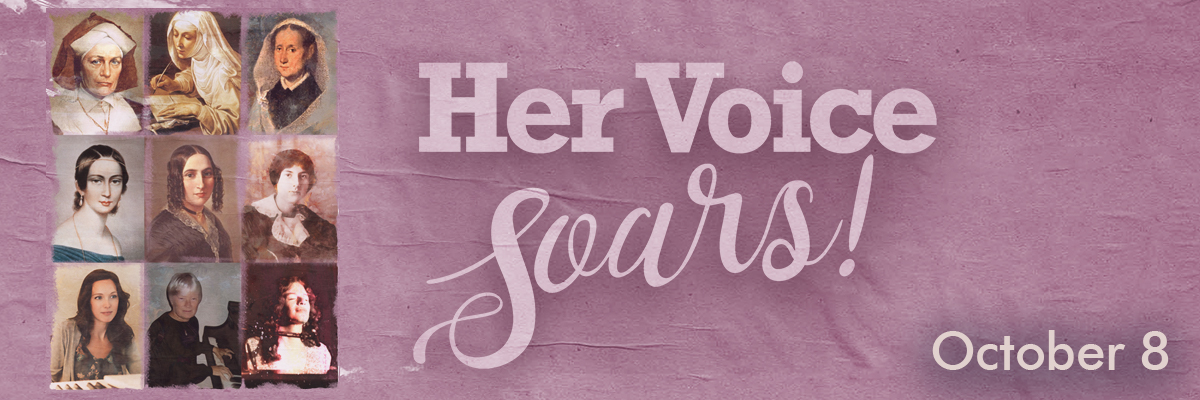
Her Voice Soars!
Sunday, October 8, 2023
Anaheim United Methodist Church
Embark on a dynamic journey celebrating the brilliance of women in music in Mertiáge’s first concert of the 2023-24 season. This musical odyssey spans across centuries, from the medieval mystique of Hildegard de Bingen, a polymath of words, composition, philosophy, and visionary insights, to the Baroque virtuosos Alleotti and Leonarda. Revel in the enchanting part songs crafted by the formidable Clara Schumann, Fanny Mendelssohn, and Lili Boulanger. The celebration doesn’t stop there; it pulses forward into the present with the contemporary mastery of musical geniuses such as Elaine Hagenberg, Emma Lou Diemer, Cecilia McDowall, and the iconic Carole King. Join the vibrant symphony of voices, echoing through time and genres, as we honor their enduring contributions to the world of music.
Karitas
St. Hildegard of Bingen (1098-1179)
Miserere Mei, Deus
Raphella Aleotti (c.1570-c.1646)
I obey thee, O Lord (Lacrimosa)
from DaVinci Requim
Ceclia McDowall (b. 1951)
Schilflied
Fanny Mendelssohn-Hensel (1805-1847)
Hymne au Soleil
Lili Boulanger (1893-1918)
Despedida
Maria Grever (1885-1951)
The Year’s at the Spring
Amy Marcy Cheney Beach (1867-1944)
It Comes as No Surprise
from Doctor Zhivago
Lucy Simon (1940-2022)
Life Has Loveliness to Sell
from Four Lyrics of Sara Teasdale
Phyllis E. Zimmerman (1934-2012)
The Music of Stillness
Elaine Hagenberg (b. 1979)
Past Life Melodies
Sarah Hopkins (b. 1958)
The Mi’kmaq Song
Lydia Adams (b. 1953)
Grandmother Moon
Eleanor Daley (b. 1955)
Warum sind denn die Rosen so Blass
Fanny Mendelssohn-Hensel (1805-1847)
Case of You
Joni Mitchell (b. 1943)
A Soft Place to Land
Sara Bareilles (b. 1979)
Someone to Watch Over Me
George & Ira Gershwin
arr. Teena Chinn
You’ve Got a Friend
Carole King (b. 1942)
Sing to Me
Andrea Ramsey (b. 1977)
Grace Before Sleep
Susan Labarr (b. 1981)
Welcome to what I feel is an extraordinary musical journey that honors the exceptional creativity, resilience, and innovation of women composers throughout our history. We gather here tonight, we lend our voices of Meritáge, to hear the “voice” of these wonderful composers. From our first rehearsal we knew this would be a concert that reverberates with the enduring legacies of these visionary artists who have enriched the world of choral music, a realm traditionally dominated by male composers, with their distinctive voices, unique perspectives, and unwavering determination. Their compositions, often marginalized or underestimated, stand as testaments to their brilliance and deserve not just recognition but profound celebration and reverence. Tonight, we invite you to immerse yourselves in the profound beauty, emotional depth, and historical significance of their work.
Our musical odyssey commences with the hauntingly beautiful “Kantus” by Hildegard of Bingen, a medieval mystic, composer, and polymath. While she was firmly grounded in the realities of her time, she is also the first composer we have with a name written upon the chants she composed. What we hope you notice is the flowing, free-form ethereal chant that expresses the texts so effortlessly and expressively. We then follow it with a motet of by Rafaella Aleotti. As alluded to before, her time and life was extremely complicated, yet there is restraint, respect, and reverence in all her work. We then jump
more than a few hundred years to Cecilia McDowall and her setting, accompanied by the organ, of the Lacrimosa from the Requiem Mass along with text of da Vinci (just a few decades prior to Aleotti!). It is a passionate composition that matches the expression, albeit more overtly, than our Medieval and
Renaissance settings with which we opened.
Clara Schumann, a virtuoso pianist and composer, graces our program with one of her exquisite choral compositions. Her profound musicality, poignant lyricism, and enduring legacy unveil a woman who defied societal norms to become a luminary of the Romantic era. We follow it with exquisite songs
of Fanny Mendelssohn-Hensel and Lili Boulanger. Both women easily earn the moniker “genius” and these are two of my favorite compositions.
Of particular interest are the two settings of Sara Teasdale that we are performing for you. I encourage you to research her life and her poetry. Never have I read of someone so willing to lose themselves to love. All that she was, all that she could be, was defined by love. There is beauty, but also immense pain in her poetry and I think Zimmerman and Hagenberg have set her texts beautifully.
We touch on some of the very creative sounds and texts from other cultures as we begin our second half of the concert. “Past Life Melodies” is fascinating, “The Mi’kmaq Song,” specifically the “I’ko” tune, is a fantastic way to escape the concert hall, and the haunting “Grandmother Moon” is a wonderful setting of a Mi’kmaq poem as it honors that community’s animistic view of the controller of all female life.
Our last set includes some wonderfully pleasant jazz, pop, and lighter musical fare. And while we savor the rich tapestry of music by women composers, let us remain cognizant of the numerous hurdles they surmounted in their creative journeys. These composers forged ahead with unwavering determination, defying conventions, and societal norms to share their unique musical voices with the world – and we are all the richer for it!
Tonight’s concert stands as a testament to the enduring power of music to transcend time, gender, and cultural boundaries. It also serves as a poignant reminder that creativity should know no bounds and that the voices of women composers deserve not merely to be heard but to be celebrated and wholeheartedly embraced. We hope that these “soaring voices” inspires you to delve further into the opulent realm of music by women composers and encourages your support for the continued advancement of women in the sphere of classical music.
